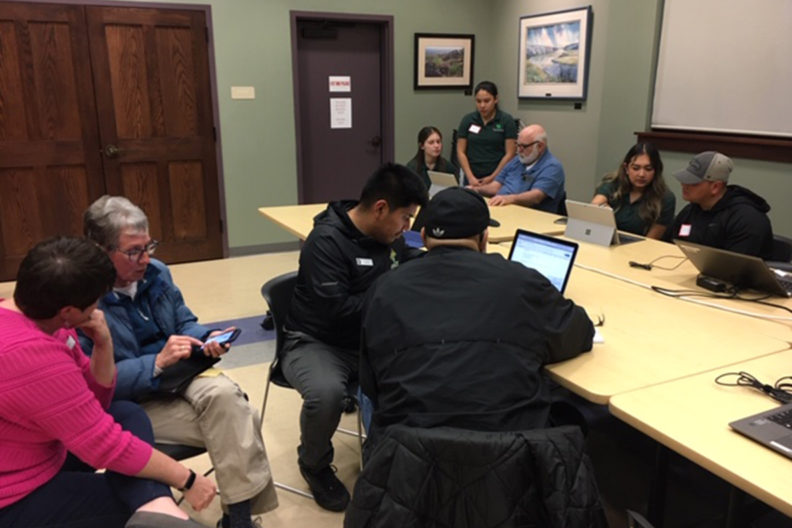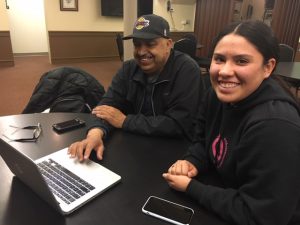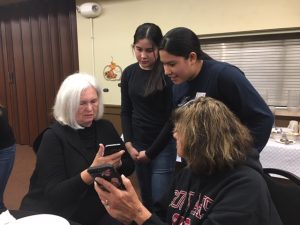
College of Agricultural, Human, and Natural Resource Sciences
4-H teens in Quincy, Washington are working to bridge the online divide in their community by leading digital skills trainings for adults.
The teens have been eager and excited to help their community, said Jeannie Kiehn, Grant County 4-H Program Coordinator.
"What they've received from it, and what the adults have experienced from it, is a connection and a respect for the different age groups in our community," said Kiehn, who is also the Coordinator and Team Leader for the Quincy 4-H Tech Changemakers.
It's all part of a new program through WSU Extension, 4-H Tech Changemakers, sprung from a grant partnership between the National 4-H Council and Microsoft Corporation. The program empowers 4-H members in 91 communities across 15 states to lead digital skills trainings, teach the value of digital tools, and find technological solutions to real world problems.
After surveys and interviews with stakeholders, youth, and families in the area, the 4-H Tech Changemaker team in Quincy found that their most important issue was adult digital literacy.
Technology skills are essential not just for the workplace, but for many everyday tasks. Adults need digital skills to pay bills online, connect with family, or view a school's parent portal. The 4-H Tech Changemaker program encourages teens to reach adults of all ages and stages of life.
"In the beginning, they were really shy with technology," said 4-H Tech Changemakers team member Nora Medina. She enjoyed watching as the confidence of the adult participants grew over time.
For the last three years, teens in Quincy have been leading classes with adults. Organizers set up tables, each with a different subject for digital learning. Participants paired up with teens to learn about computer programs, social media, or cell phone use. Amid the COVID-19 crisis, 4-H youth are holding appointments with adults who want to learn virtually.
Limited access to broadband Internet, coupled with the increased demands for digital skills, is impacting access to economic opportunities to youth across the nation, especially in rural areas, according to 4-H.
The FCC reports that approximately 19 million Americans still lack access to broadband Internet. In rural areas, nearly one-fourth of the population lacks access, and in tribal areas, the population lacking access is nearly one third. COVID-19 has cast a spotlight on much needed broadband access and digital skills training for vulnerable populations.
4-H Tech Changemakers member Daisy Buenrostro said one of her favorite parts of the program is getting to know people in her community she wouldn't have known otherwise. Buenrostro and Medina have been part of the program since its inception.

"Being able to see that we are making a difference in someone's life," said Buenrostro. "It doesn't matter how small it is."
Adult participants were often familiar enough with their devices to be able to use them, but with assistance from the 4-H Tech Changemakers, they learned shortcuts and tech insight to enhance their user experiences.
"The little things that just make stuff faster and a bit easier to use," said Buenrostro. Often, it was as simple as just a few more clicks on the keyboard.
"Each adult comes to this program with different needs," said Nancy Deringer, State Program Leader for 4-H Youth Development through the Youth and Families Program Unit at WSU Extension. "This is the perfect opportunity for the teens to be the teachers."

At an event in March, one adult was receiving tutoring on Excel for his new job, and a retired teacher was learning how to use Facebook.
Deringer would like to see the program expanded statewide. There are currently five Washington counties participating in the program along with Quincy. The other counties funded in Washington include; Spokane, Ferry, Whatcom, and Skagit counties.
Both Medina and Buenrostro have been invited to speak on panels at Microsoft's headquarters in Seattle, and flown to Washington D.C. to speak about their experiences in 4-H Youth Development.
"For a girl from Quincy to be in Washington D.C. speaking about our experiences is so exciting," said Medina. "It's been an amazing opportunity to be a 4-H Tech Changemaker."






